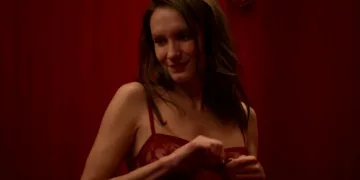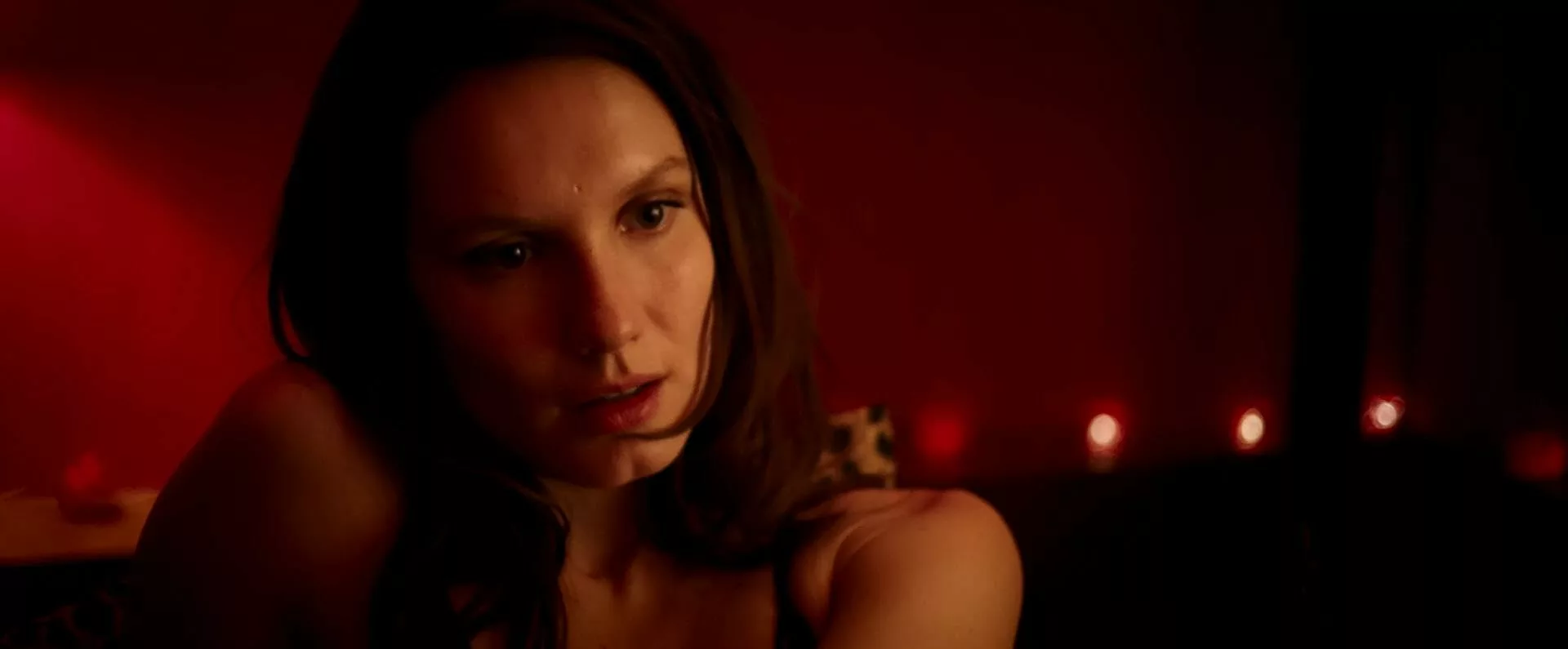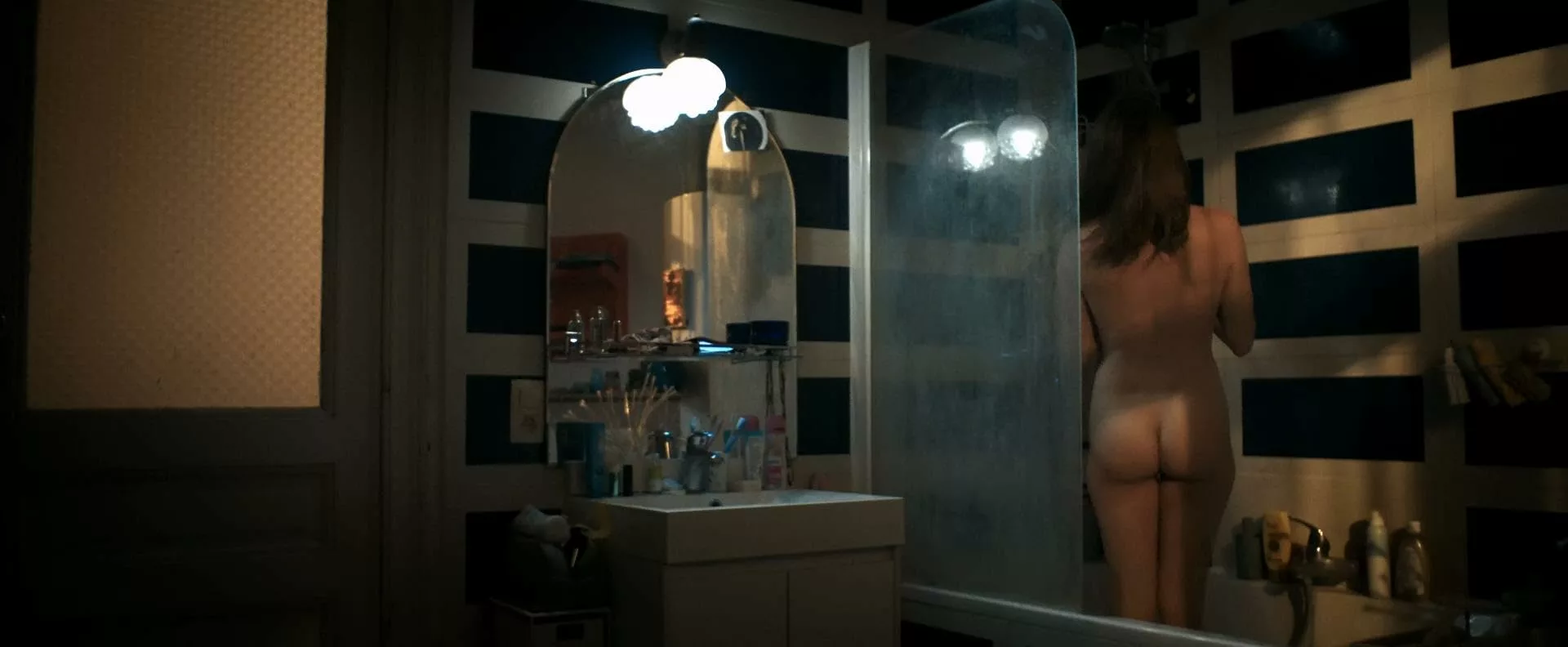Prostitution is a subject seldom explored in cinema, often reduced to surface depictions that sensationalize more than enlighten. Anissa Bonnefont’s debut feature, The House chooses a more thoughtful approach, immersing viewers in the unseen world of a Berlin brothel through the experiences of its protagonist, Emma.
Adapted from a novel by French author Emma Becker, the film tells of a writer who takes a job in a brothel, hoping to bring deeper understanding to her work. We meet Emma as she leaves behind a past relationship in France, traveling to Berlin and the company of her sister.
Feeling uninspired, she decides the underground life of sex work may offer a perspective she lacks. Starting at a bleak establishment, Emma soon moves to The House, drawn by its warmer family atmosphere among prostitutes from varied walks.
Bonnefont focuses not on lurid encounters but on the humanity within this marginalized community. We witness Emma’s personal transformation as professional lines blur, developing intimacy with a client turned lover. This introspective tale is less a glorification of sex work than an authentic gaze into realities seldom acknowledged.
While only scratching debates around consent, Bonnefont succeeds in illuminating shared hopes, fears, and solidarity across perceived social lines. For those willing to immerse themselves in seldom-seen worlds, The House presents a compassionate glimpse inside a closed world.
Navigating Forbidden Desires
Emma is a young French writer seeking inspiration for her next book. Recently single, she relocates to Berlin to stay with her sister and immerses herself in the underground world of sex work. Hoping to understand perspectives she lacks, Emma decides to take a job at a local brothel.
She starts at a bleak establishment simply called “The Carousel.” The sterile atmosphere and abusive clients leave her feeling empty. But her interests are piqued by rumors of a homier place known as “The House”. There, she finds camaraderie among an eclectic group of women whose motivations vary from earning enough to spend time with family to fulfilling sadomasochistic desires.
As Emma observes the diverse clientele, ranging from ashamed married men to those exploring secret fetishes, she catalogs her experiences in her ever-present notebook. Her interactions help shape intimate portraits of those navigating complex relationships with intimacy, sex, and power. One troubled man seeks gentle compassion his wife withholds, while a curious young father receives an educational service.
Emma soon settles into her work, confident in her ability to satisfy desires and maintain control over her sensuality. But a chance meeting through a dating app stirs up unfamiliar feelings. Her connection with Ian grows deeply caring, yet it compromises her sense of independence. Facing disapproval from loved ones only compounds inner conflicts around what she accepts as work versus what could be love.
As Emma delves deeper into desires both professional and personal, she gains a new understanding of women, often seen merely as objects. Her vivid chronicle promises to offer voices seldom heard while questioning at what price one exercises agency over their own body.
Acting and Directing with Care and Conviction
Anissa Bonnefont’s work behind the camera for The House deserves high praise. This constitutes her directorial debut, yet she navigates this sensitive subject matter with a steady, assured hand. Bonnefont ensures the various brothel settings feel truly lived-in and real. From the sterile neon-lit walls of “The Carousel” to the warmer, almost homey atmosphere of “The House”, you feel transported to these intimate yet gritty worlds.
It’s a testament to Bonnefont’s skills that such explicit content avoids ever feeling exploitative. She trains her lens on the performances and perspectives of women, highlighting their agency and humanity rather than objectifying them. Some scenes naturally push boundaries with their graphic displays of embodied experiences. Even so, Bonnefont frames them in a way that highlights trust and vulnerability between all involved.
Of course, the success of any film ultimately depends on the efforts of its actors, and The House has a powerhouse leading lady in Ana Girardot. Her role as the conflicted yet determined Emma requires baring both body and soul. Girardot does so fearlessly and uncompromisingly, imbuing her character with nuance and complexity. Whether in scenes of loneliness or intimacy, a sense of gritty realness and emotional rawness comes through.
Supporting players like Aure Atika and Rossy de Palma also shine, embedding their work with dimension through subtle gestures and glances. Their characters feel recognizably human despite operating in this world of extremes. Jointly, the performances ensure The House resonates as much for its indelible characters as for its unvarnished depiction of hidden realities often ignored. Both behind and before the camera, artists appear fully committed to honoring honesty, empowerment, and compassion.
Facing the Complex Reality of Prostitution
The House sets out to offer insightful glimpses into the lives of voluntary sex workers through Emma’s experiences. Upon joining Berlin’s brothel circuit, we’re exposed to a diverse cross-section of motivations driving the women. Some, like Brigida, value the flexibility to spend time with loved ones, while others, such as Delilah, see it as lucrative work they feel empowered doing. Through intimate conversations, we gain nuanced perspectives beyond preconceived notions.
Emma similarly encounters an eclectic mix of clients, some disrespectful but many simply lonely or curious. Scenes portraying Hermann’s tender lesson in cunnilingus or the affection between regulars like Mark and his server challenge preconceptions of such relationships. “The House” itself emerges as a place of solace, its support network of peers providing the security many sex trades lack.
Nonetheless, the film could have probed further beneath its realistic but mostly positive veneer. While clearly aiming to honor lived experiences, it skims over the harsher realities some face, glossing over how fully informed consent can be complicated by circumstances. And its focus on empowerment feels simplistic at times, not addressing the structural factors driving many into the industry.
Overall, The House presents a commendable effort to shed light on an immense gray area. But in highlighting prostitution’s potentially self-determined aspects, it risks underexploring its complexities and the varying degrees of true choice involved. With a bit more probing beneath the surface, it might have offered an even more nuanced portrait of this controversial issue.
Finding Freedom and Connection
Taking on the role of Justine allows lead character Emma to embark on a journey of understanding herself in a new light. Through intimate moments with clients, she gains insight into desires and embraces pleasures long kept private. Her work provides a means to financial independence as well as personal liberation.
Yet lines between profession and intimacy blur when she begins seeing Ian. Their tender scenes contrast starkly with transactional sex acts elsewhere. Ian tries respecting her career, but his own feelings challenge this. Meanwhile, Emma discovers that reclaiming sexuality on her terms leaves room for meaningful connection.
The House highlights women celebrating their agency over their bodies. It focuses on female desire and permission to explore wants freely, untouched by prejudice. Figures like Delilah depict empowerment found in embracing one’s sexuality fully as opposed to denying it for social acceptance.
Still, the film leaves unclear how much one can separate emotion from monetized physicality. While endorsing the rights of all to make a living as they choose, it avoids knotty issues around commodifying intimacy. Emma’s affection for Ian suggests prostitution risks draining future relationships of romance by reducing all vulnerability to monetary terms.
Overall, the movie offers a nuanced portrait of self-realization through demanding work. But in stressing empowerment, it presents an incomplete picture—one where institutional and societal factors shaping participation seem neatly resolved through individual will alone. A few more unflinching questions may have painted fuller scenes.
A Respectful but Restricted Lens
The House handles its theme with nuance, portraying the perspectives of sex workers in a thoughtful manner without overt judgment. Anissa Bonnefont aims to start a discussion rather than declaring one side right or wrong.
The film makes clear that this path is not for all, as some work under more coercive conditions. But characters also discuss finding empowerment through embracing their sexuality. This balanced view recognizes varied realities rather than broad stereotypes.
Still, it only scratches the surface of larger debates. While giving voices to those who choose the work, it does not profoundly interrogate the factors driving that choice. And although power dynamics surface, consent and control are not deeply probed.
We learn much about Emma’s personal transformation but less about systemic challenges for the industry. Her experience suggests one can detach emotion, but the implications of long-term effects are left unexplored.
Overall, The House presents an admirably sensitive entrance to its subject. But it keeps perspectives safely narrow and stories pleasantly surface-level. A little less fear of discomfort may have offered fuller insights, moving discussions further rather than just beginning them.
The film opens minds in a respectful way, but its restricted scope prevents truly innovative thinking on modern sex work’s complexities. As with Emma’s clients, we are given just enough revelation to feel versed while remaining partially clothed.
A Respectfully Surface View
The House provides a thoughtful look at prostitution through the experiences of Emma and her fellow sex workers. Anissa Bonnefont crafts intimate moments that give audiences a feel for their daily lives. From client interactions to the bonds between colleagues, we see both the difficulties and small pleasures many find in their work.
Despite achieving empathy, the film does not challenge presumptions or illuminate broader contexts shaping this choice. Emma’s journey of discovery remains solely personal. By the story’s end, we glimpse her world but understand little of what drives so many into its hidden corners.
Nor does the director leverage her unparalleled access to foremost interrogate issues of agency, endangerment, or what society could change. This inside view brings understanding, not radical insight.
By depicting prostitution’s humanity without reducing individuals’ autonomy, Bonnefont opens discussion harmoniously. However, vaster realities remain murmured, and the problems of many are still veiled. The House shows intimacy, not its fullest complexities.
With care and sincerity, the film starts a respectful dialogue but does not conclude it. Through personal perspective, it presents prostitution’s face, but the forces defining its true contours are for audiences still merely surmised. Its vision remains narrow, even as its hand extends the discussion further.
The Review
The House
The House offers an intimate glimpse into the world of sex work, told with care and sincerity through Emma's personal experiences. However, it can only scratch the surface of this complex issue due to its narrow focus on individual perspectives over broader structural realities. Overall, Anissa Bonnefont approaches a delicate subject respectfully to open thoughtful dialogue, but the film does not attempt definitive conclusions.
PROS
- Offers an intimate and nuanced portrayal of life as a sex worker through Emma's experiences.
- Approaches a sensitive topic with care, respect, and sensitivity without condemnation.
- It depicts prostitution's humanity and avoids stereotypes through multi-dimensional characters.
CONS
- The story remains focused on Emma's personal journey rather than structural power dynamics.
- Fails to substantially interrogate or challenge views around agency, choice, or coercion in sex work
- Missed opportunity to leverage access and insights to probe deeper issues shaping this industry





















































